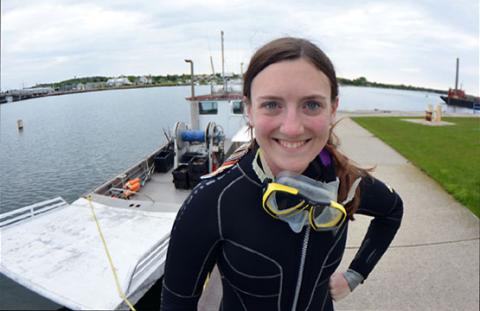
East Carolina University
As a maritime archaeologist, it is not only my job to record and study wrecks, but also to help spread that research to others. Outreach is a big part of underwater archaeology.
Education
- B.S., History and Geography, Carthage College
- M.S., Maritime Studies and Underwater Archaeology, East Carolina University (candidate)
Contact
What is your current job and what does it entail?
I am in my second year as a student in the maritime studies program at East Carolina University. As an underwater archaeologist, the main goal is to record shipwrecks, harbors, maritime artifacts and any other type of maritime culture for the preservation and maintenance of maritime cultural heritage. The underwater environment is so dynamic that much of what is currently preserved there can disappear as quickly as it appears. By recording these wrecks and maritime culture, information from projects can be stored and used for educational and research purposes in the future. The program at ECU consists of a combination of maritime studies classes focusing on anything from ship construction to archaeological theory and maritime history. We are also trained as AAUS certified scientific divers so that we can participate in the program's two field schools. These field schools allow us to gain practical knowledge of underwater archaeology and what being on a project actually entails. Our most recent field schools took us to Sturgeon Bay, Wisc.; Alpena, Mich.; and Manteo and the Outer Banks of N.C. While in school, I'm working as a graduate assistant for the history department at ECU, assisting professors each semester with their classes. Each year, many students in the program receive these graduate assistantships as well as other scholarships.
What was the key factor in your career decision?
I grew up around the Great Lakes so I have always had a love of the water and all types of boats; for me this career seemed like the perfect fit. Water has been the major mode of transportation of goods and people for a very large portion of human history. Its usage is intimately tied to the human story, and that is something a lot of people today don't think about. As a maritime archaeologist, it is not only my job to record and study wrecks, but also to help spread that research to others. Outreach is a big part of underwater archaeology. Getting involved with people and helping them understand the importance of underwater archaeology and preserving maritime heritage is an important part of this field, and I think that was one of the biggest factors in my decision to continue pursuing this career.
What do like most about your career?
Getting to interact with people and spreading an understanding of this field and what it is we do. Also, getting to dive on shipwrecks few people have ever seen is another key perk of the job. It can be incredibly challenging, but that's what makes it enjoyable. There is never a dull moment in this field.
What do you like least about your career?
Sometimes the diving is not in the most ideal places. From trudging through snake infested waters in a sound, to diving in 55 degree water, to zero visibility on a metal wreck with ocean surges, this is certainly not a glamorous career. But at the same time, it is in precisely those situations that I find myself enjoying what I do the most. It's challenging, but extremely rewarding.
What do you do to relax?
I read mostly. I always like learning more, so whenever I get an opportunity, I take it.
Who are your heroes/heroines?
Anyone who has ever decided to pursue something that challenges them, and then never given up.
What advice would you give a student who expressed an interest in pursuing a career in your field?
At the high school level, and even the college level, there aren't many specialized programs in this field, though there are some. I would say start reading as much as you can about maritime archaeology as well as maritime history. Also, try diving to see if it is something you like to do. Going into related fields, such as archaeology, history, geography or anthropology in college can help prepare you for a master's program in maritime archaeology. The more you learn early on will only help you later. But never stop asking questions, and never give up.
Are career opportunities in your field increasing or decreasing and why?
Career opportunities are generally increasing in the field of maritime archaeology, primarily because maritime archaeologists create opportunities for themselves. While we are an established field, maritime archaeology is a relatively new field, only developing in earnest in the last 30 years. Because of this, many regions have yet to realize the importance of having maritime archaeologists preserving maritime heritage. Many of the current maritime archaeology programs housed by state agencies were started by maritime archaeologists presenting a case for why they are necessary. Another sector of career opportunities involve remote sensing and other underwater surveying technology. Many oil companies are now employing underwater archaeologists to survey underwater landscapes on which pipelines are to be laid. As oil companies expand, the opportunities for maritime archaeologists are expanding as well. Because this field is still in its youth, career opportunities will likely only continue to grow.
What will you be doing 10 years from today?
Hopefully I will be working for a state agency or non-for-profit organization recording shipwrecks and other underwater sites in order to preserve maritime heritage. Being able to dive, travel, present, research and work with public outreach. Especially keeping excitement in my job, and always taking on new challenges.

